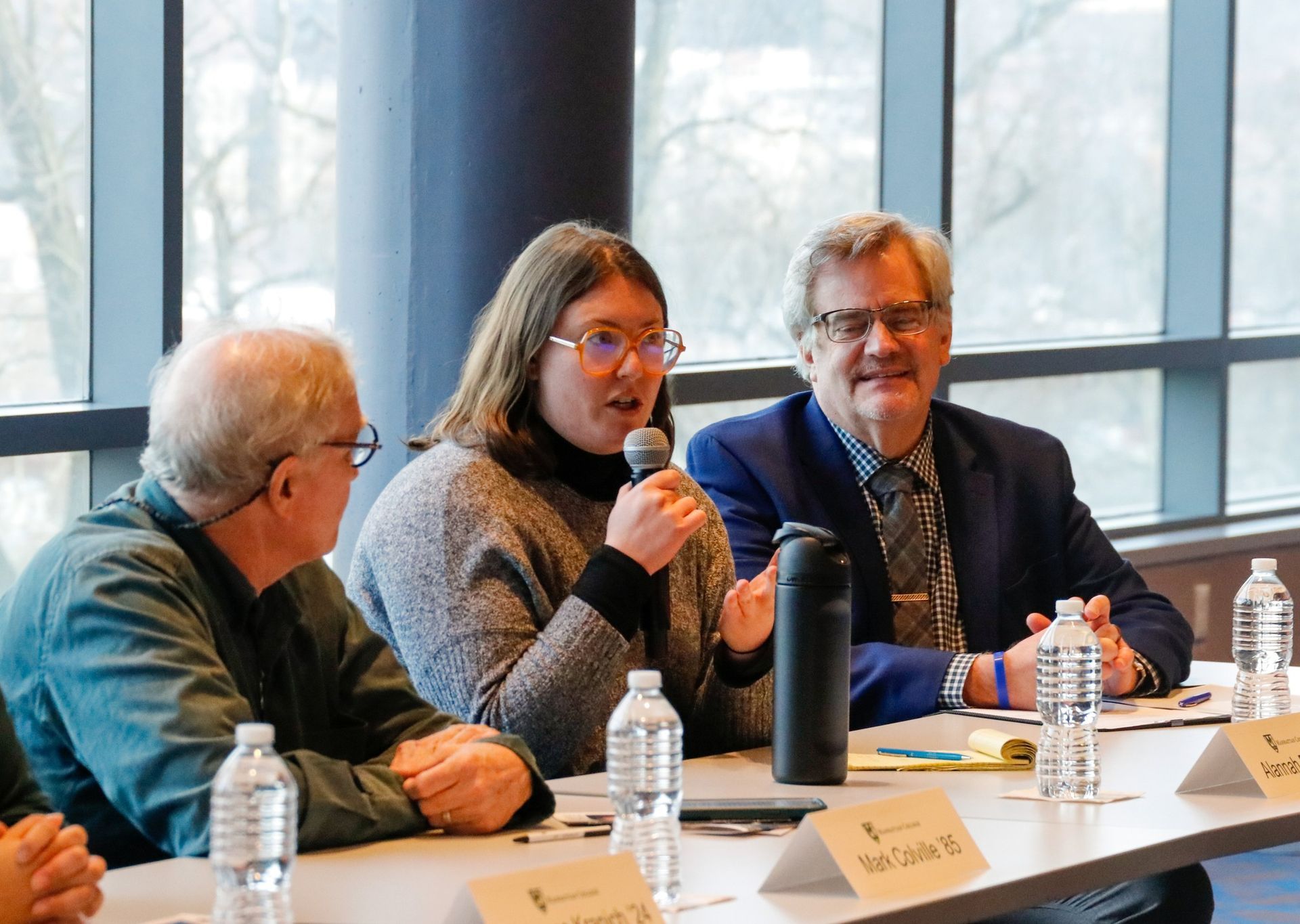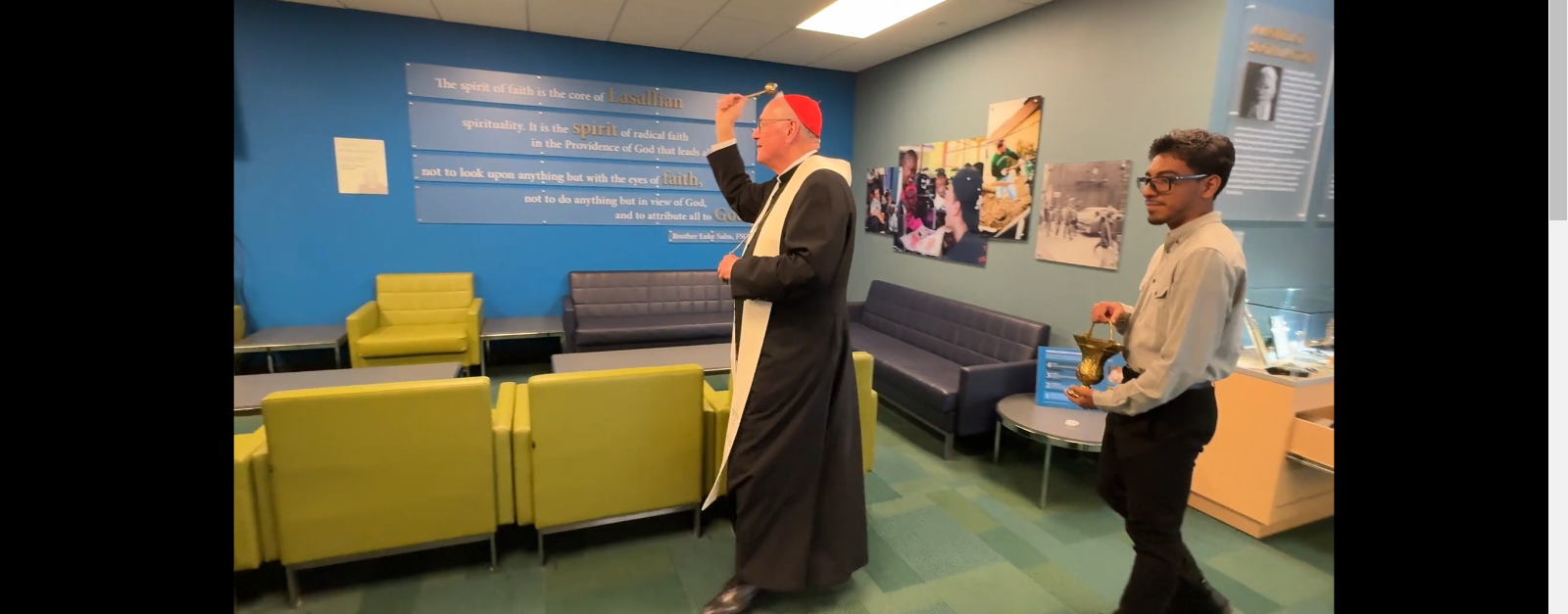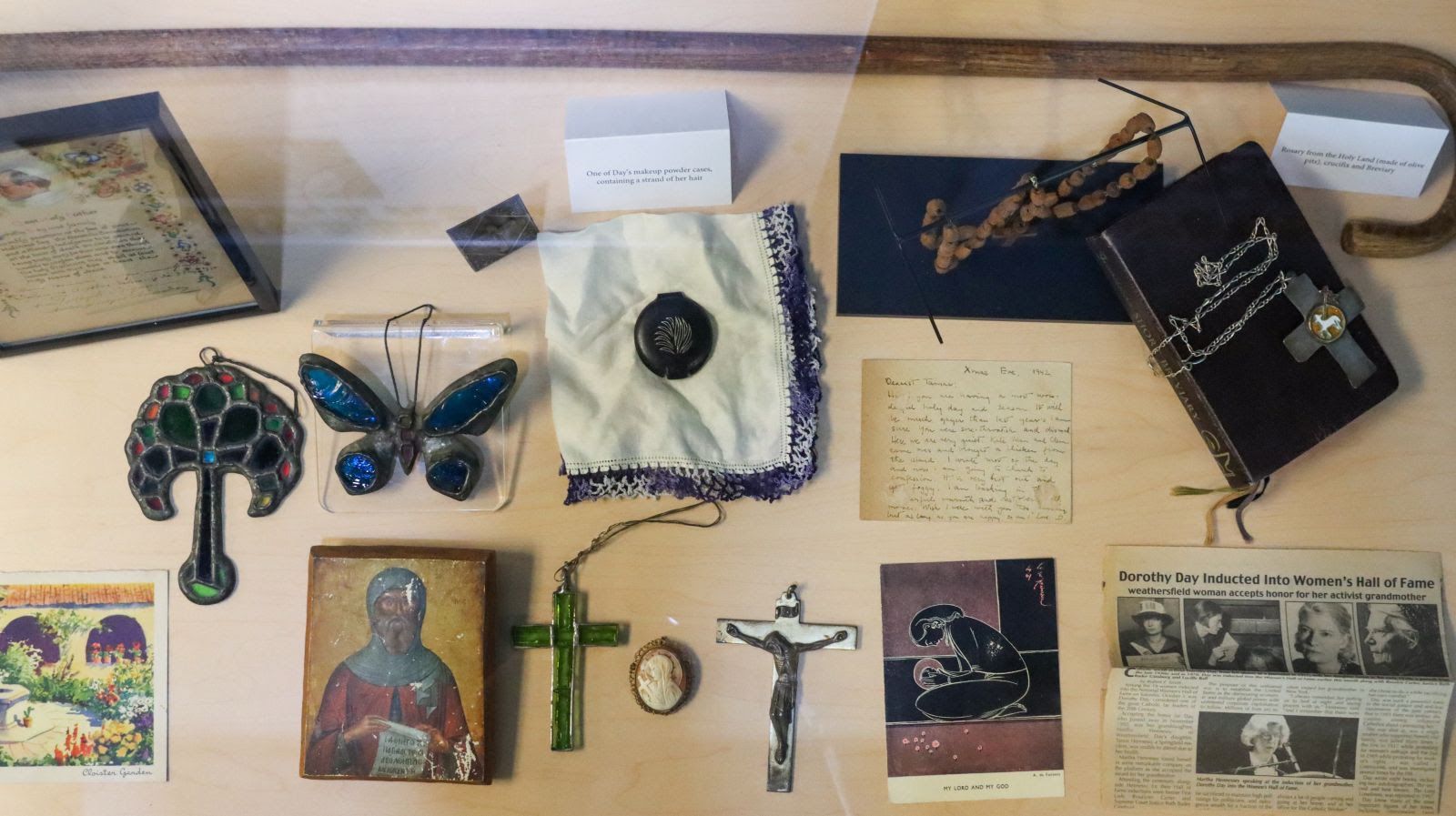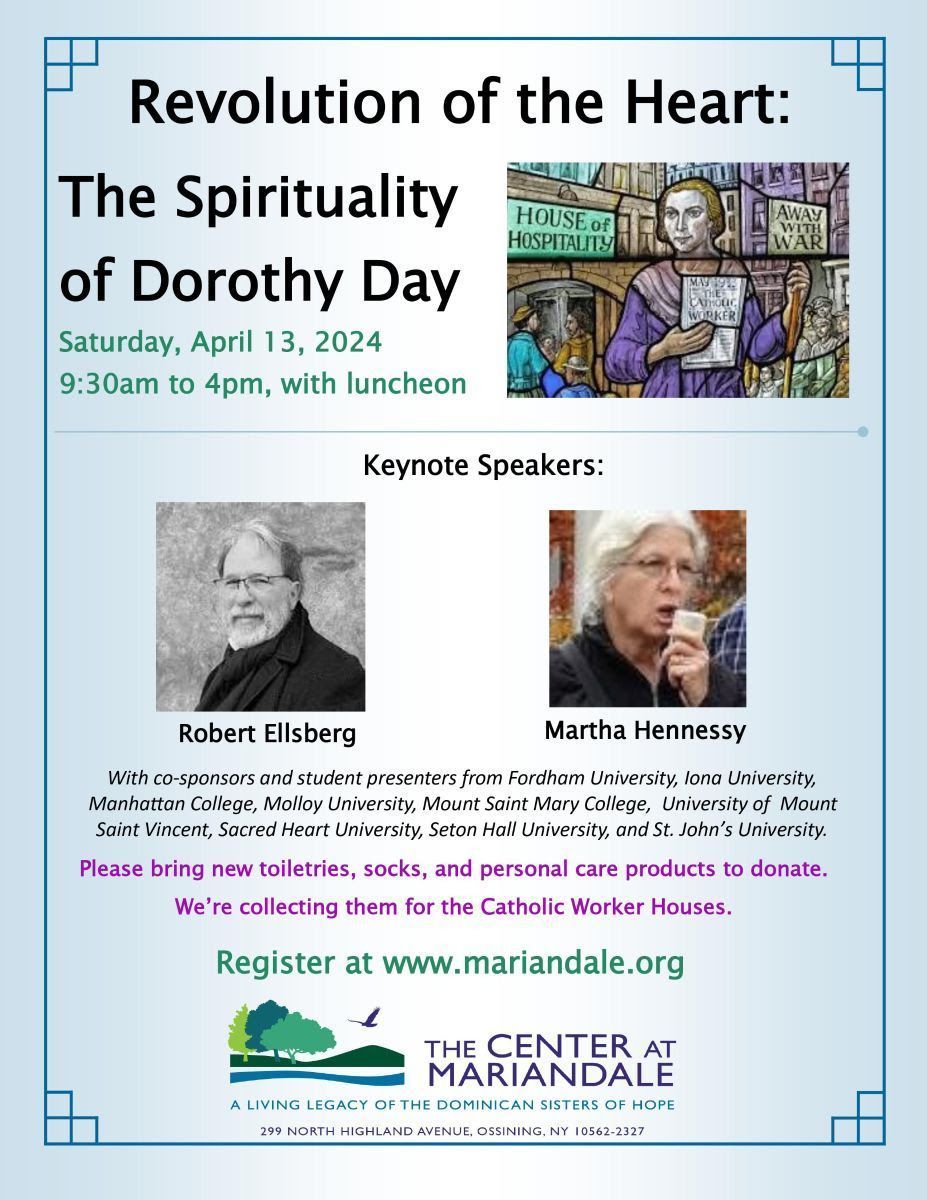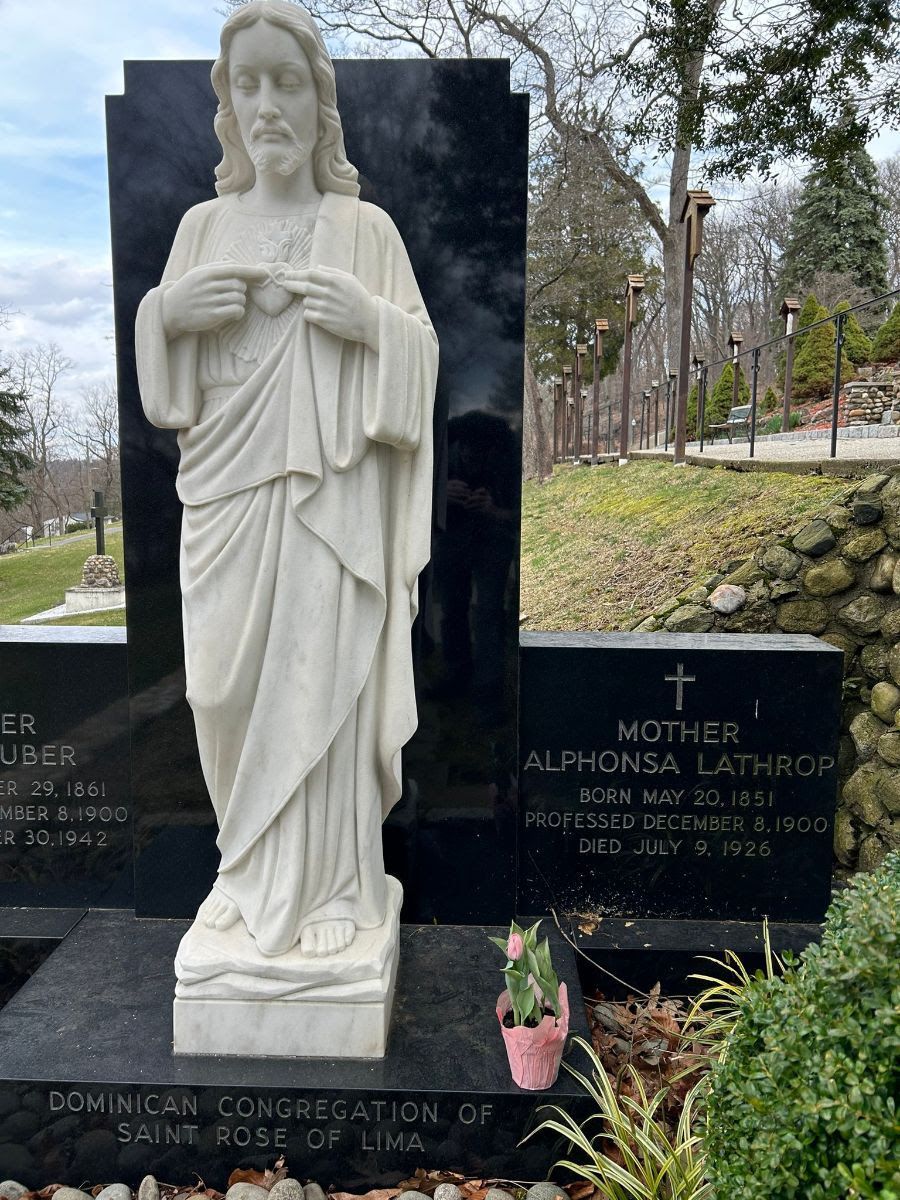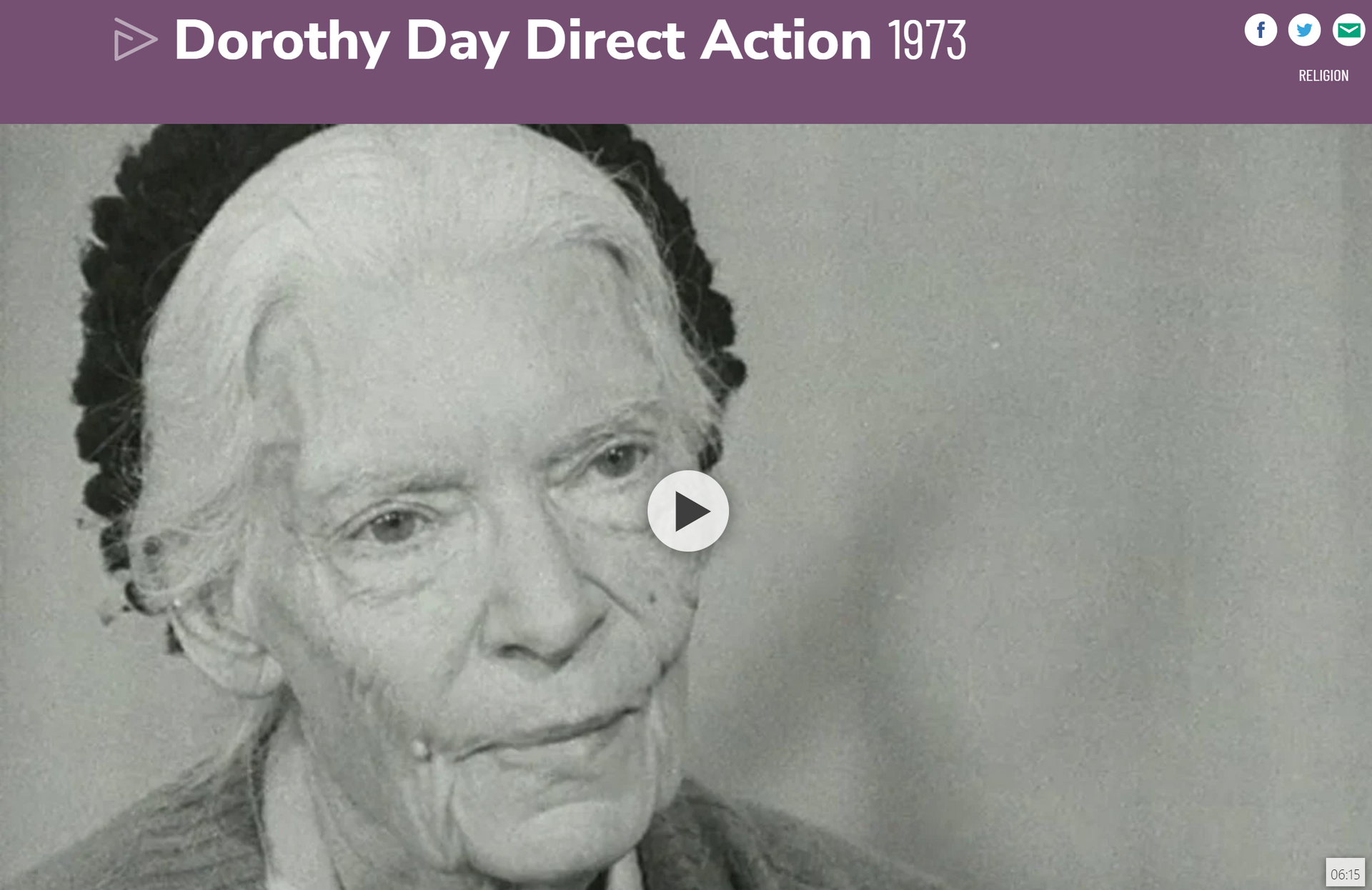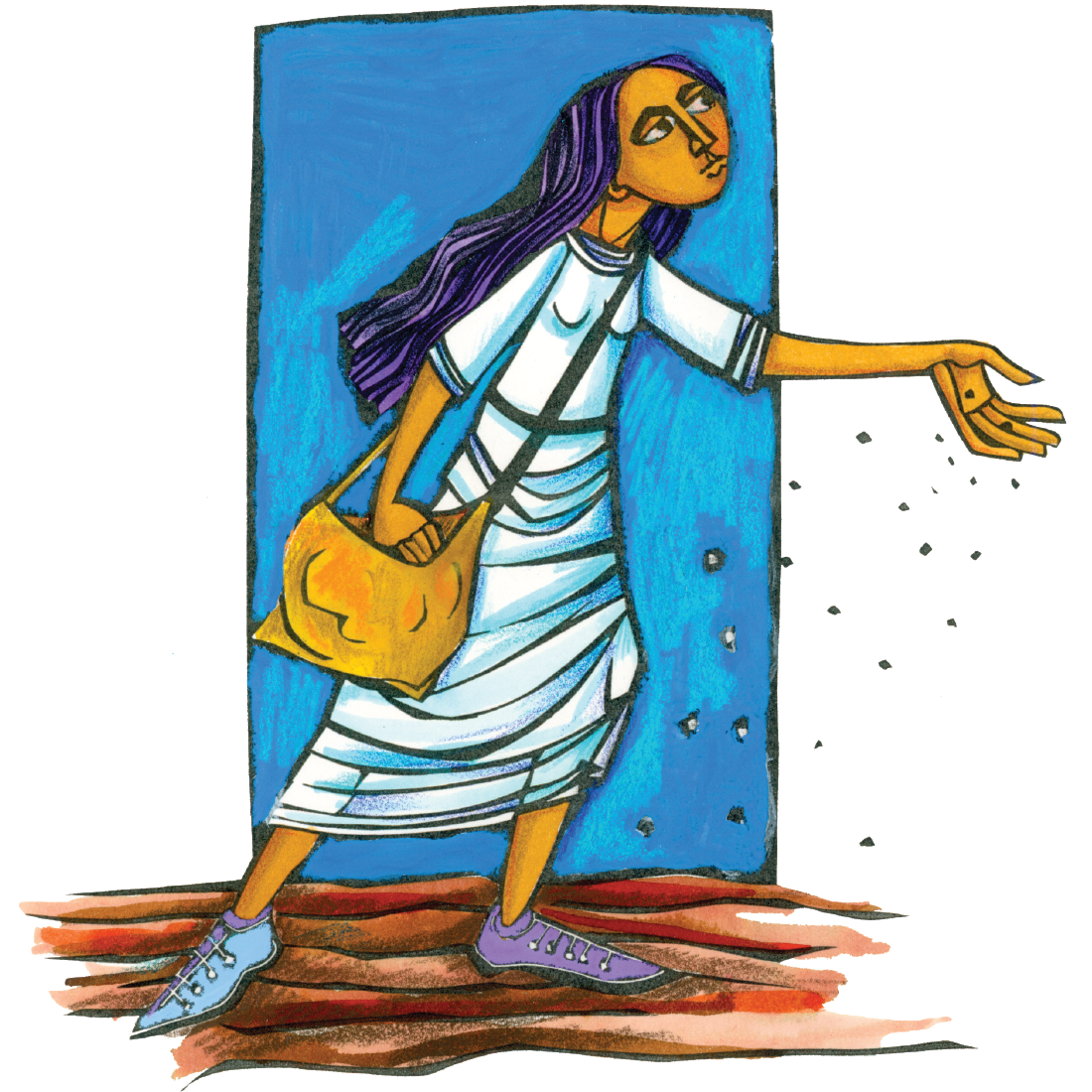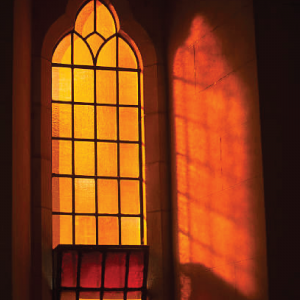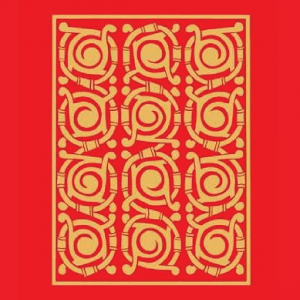Our monthly update of Guild events, service and learning opportunities, and reading recommendations
Dear members and friends of the Dorothy Day Guild,
Greetings, and happy feast of St. Joseph! We hope that this Lenten season has been a fruitful time of growing closer to Christ for each of you– in prayer as well as through action on behalf of and in solidarity with those around the world who are suffering the effects of war, displacement, and poverty. Dorothy loved the peace and solitude of this time of year; in 1965,
she hoped to spend the last ten days of Lent in holy silence, although we have doubts that her bustling community ultimately left her undisturbed that long! While maintaining holy silence in the midst of our busy lives may feel like a stretch for most of us, please know that we at the Guild are praying for you and your intentions as we approach Palm Sunday and the sacred events of the Paschal Triduum.
We also really appreciated a recent article by Sister Judith Best, published in
Global Sisters Report,
“What I Learned From My Friend Thomas Merton,” on the deep mutuality and respect at the heart of the friendship between Dorothy and Merton. Best writes that both Dorothy and Merton desired a spiritual life that was firmly grounded in the real concerns of the world, and
needed to speak and write to call companions to a deeper following of Christ, especially the poor Christ. They wrestled with tough questions, such as the self-immolation of
Roger LaPorte, to protest U.S. involvement in Vietnam, considering whether to remain a monk or leave to lead the peace movement or other groups, etc.
What helped them both persevere was the witness of others in a centuries-old commitment to follow the poor man of Nazareth and meet the poor of the world on their own turf and in their own words.
In reading this piece, I was again reminded of the incredible strength Dorothy’s many friendships provided for her and how through these relationships, she was sustained in her vocation of contemplative activism. We hope and pray that through Dorothy’s intercession, all of you are also sustained by friendships which challenge and encourage you in your own vocations.
Finally,
America
republished some of Dorothy’s writing earlier this month, as
“Dorothy Day’s ‘Letter to an Agnostic.’” This letter, originally addressed to a younger friend in 1934, is written from the perspective of one who has stood in the reader’s shoes, who has felt the existential numbness and the temptation to nihilism, has rejected the notion of God’s existence, let alone concern for humanity…and has come out the other side of this exile. Dorothy writes to her friend,
I felt this despair when I lay in jail for fifteen days (after demonstrating for the rights of political prisoners), contemplating the fundamental misery of human existence, a misery which would remain even if social justice were achieved and a state of Utopia prevailed. For you cannot pace the floor of a barred cell, or lie on your back on a hard cot watching a gleam of sunlight travel slowly, oh, so slowly, across the room, without coming to the realization that until the heart and soul of man is changed, there is no hope of happiness for him.
The late Pope Benedict XVI wrote in his 1968
Introduction to Christianity, “Just as the believer is choked by the salt water of doubt constantly washed into his mouth by the ocean of uncertainty, so the nonbeliever is troubled by doubts about his unbelief.” Dorothy, too, understood doubt as the common table across which the agnostic and the committed Christian could sit, share a meal, and have a conversation. If you read only one thing during Holy Week, and especially on Good Friday, let it be this letter.
Recent and Upcoming Guild Events:
This Friday will mark one month since we formally dedicated the Dorothy Day Center for the Study and Promotion of Social Catholicism at Manhattan College! The official opening of the Dorothy Day Center was the culmination of years of labor and organizing to create a space where students and other interested visitors could learn more about Dorothy’s life and her living legacy of nonviolence, voluntary poverty, activism, and hospitality.
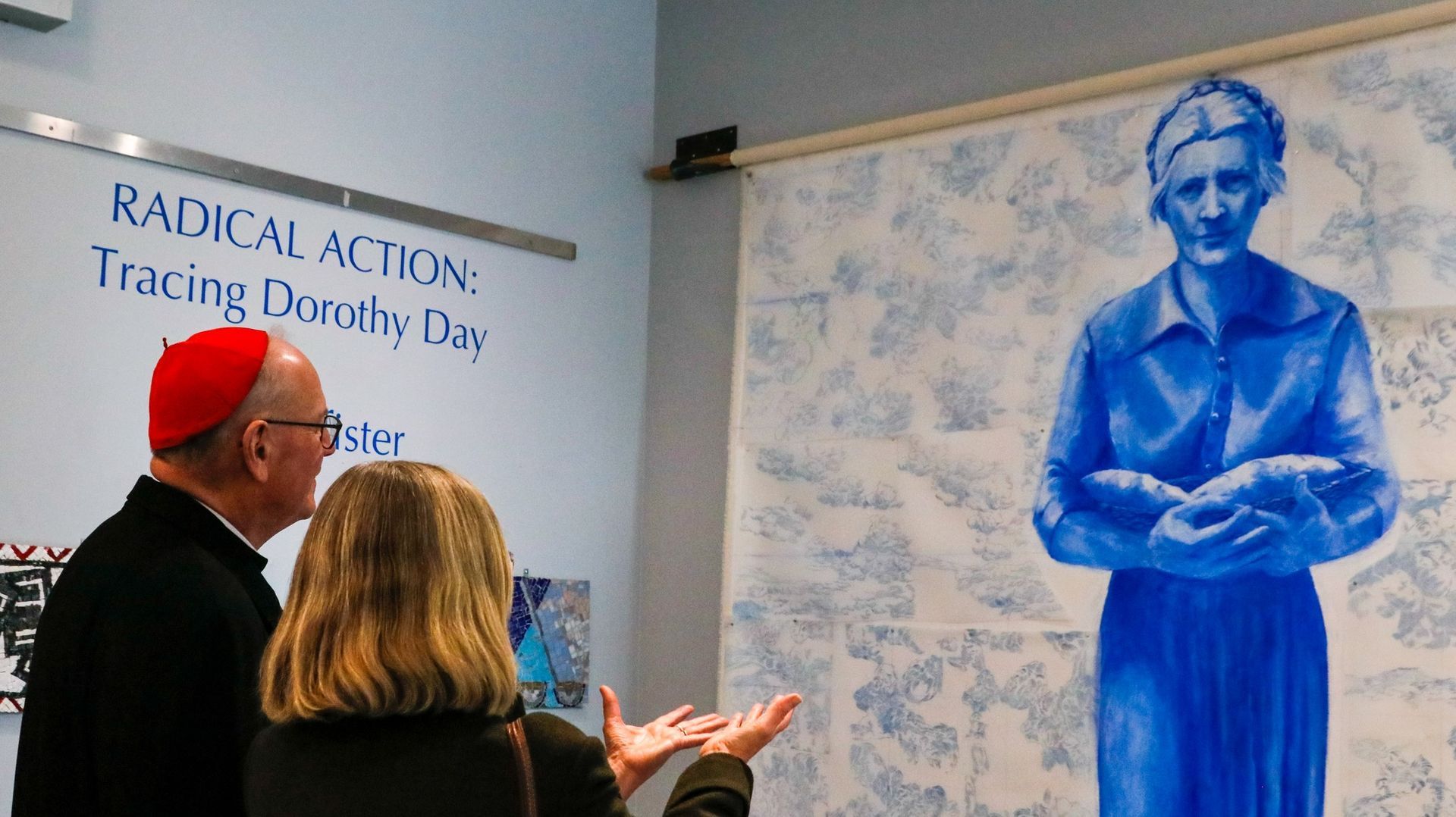
Slide title
Write your caption here
Button
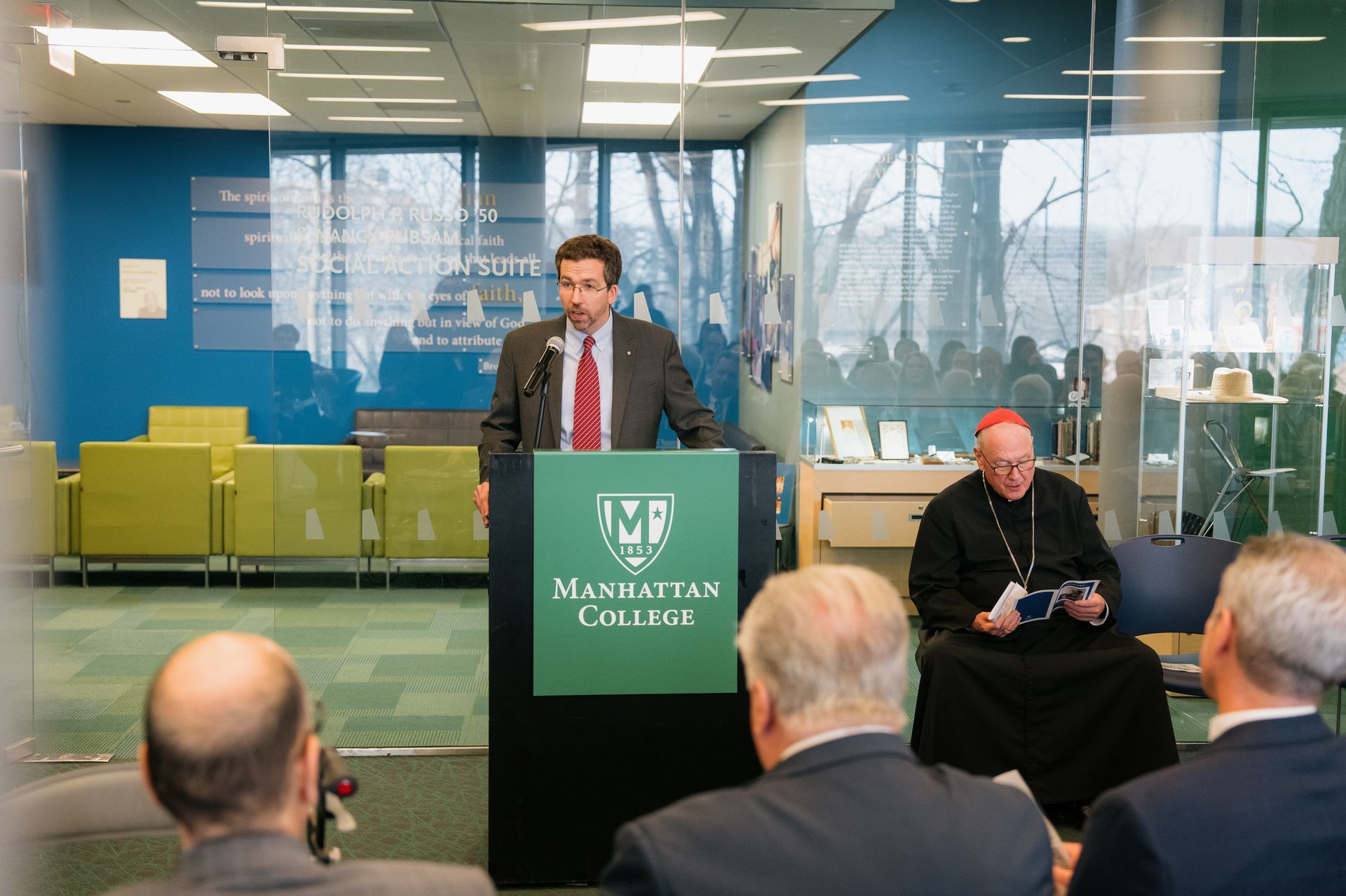
Slide title
Write your caption here
Button
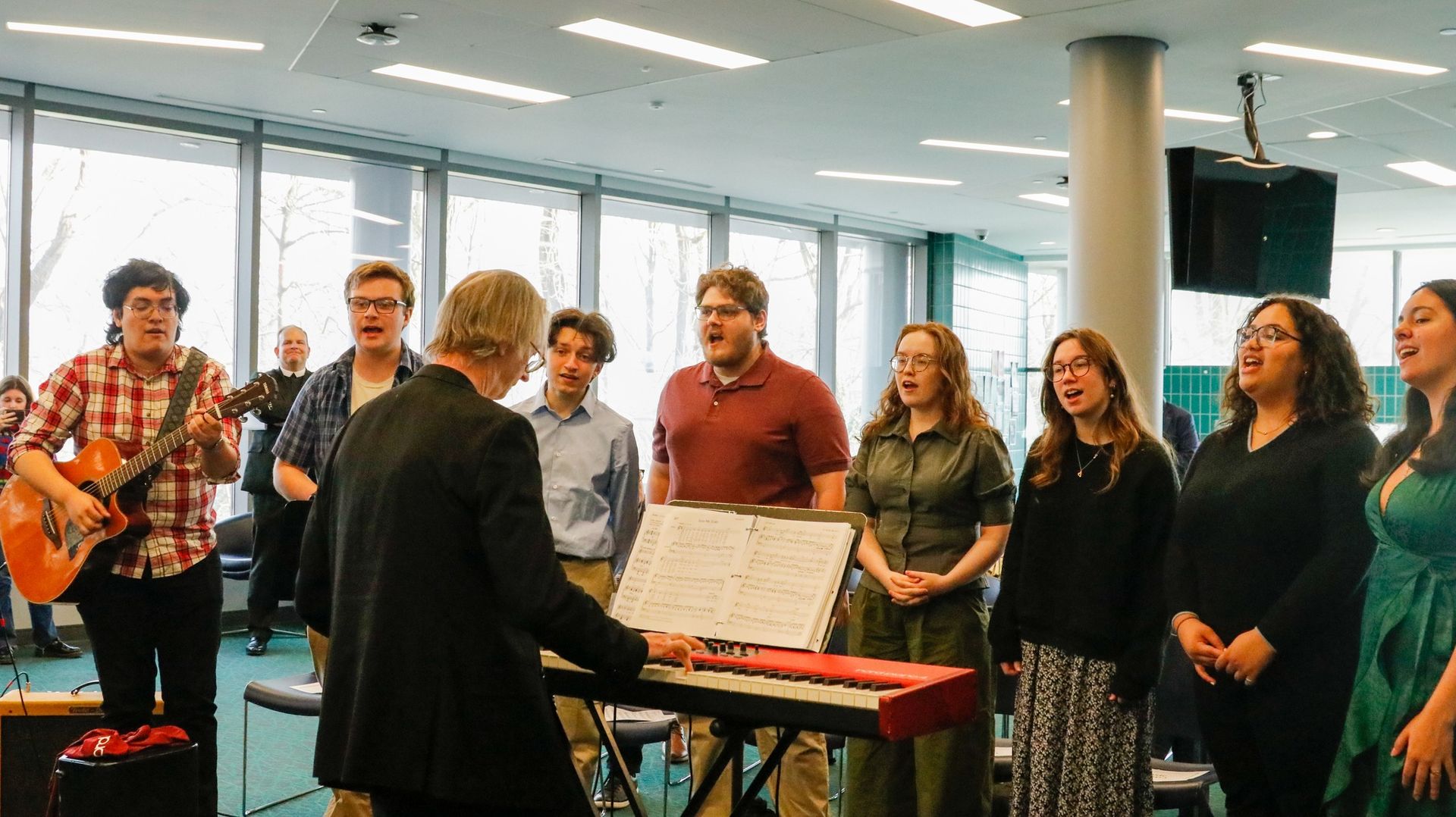
Slide title
Write your caption here
Button
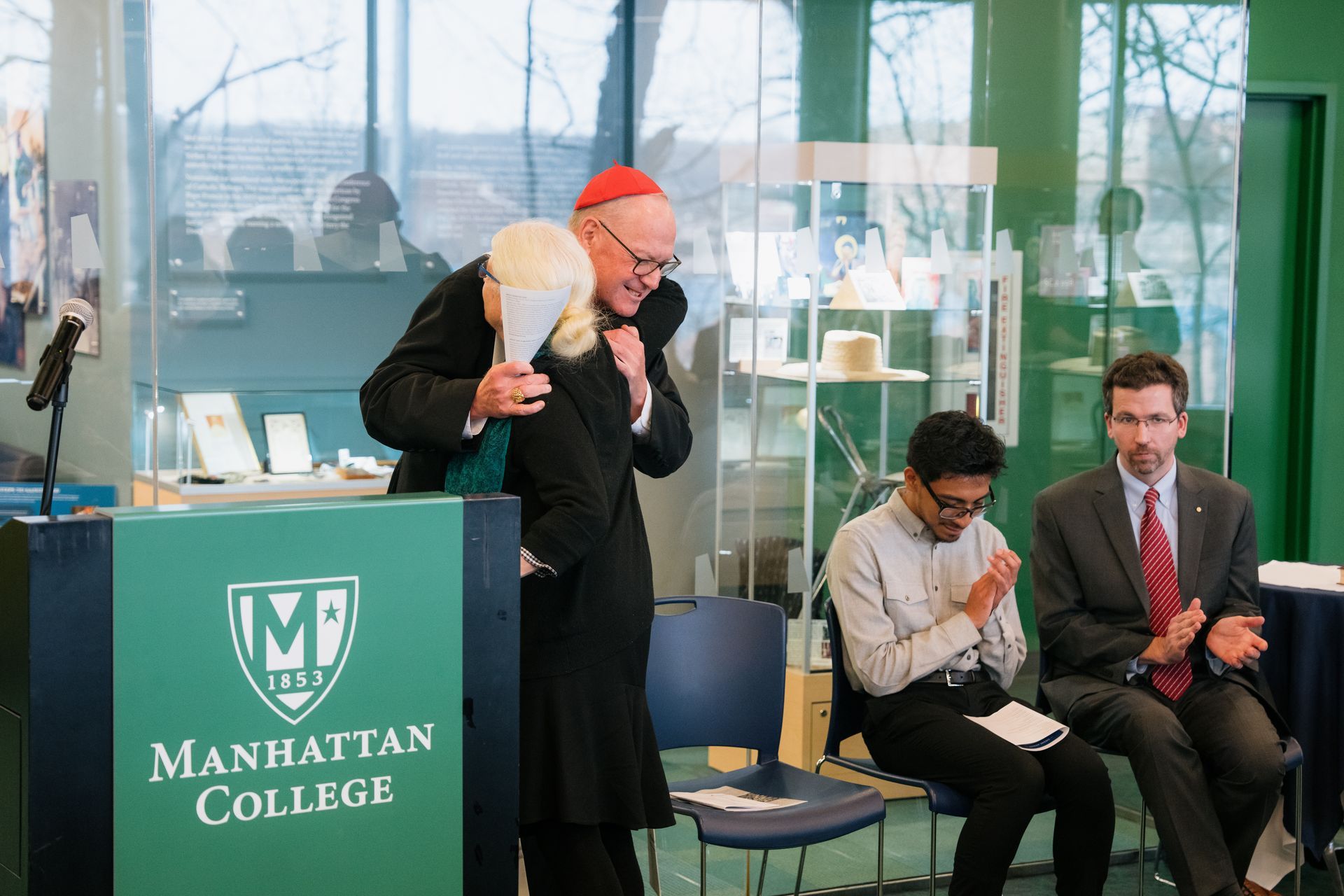
Slide title
Write your caption here
Button
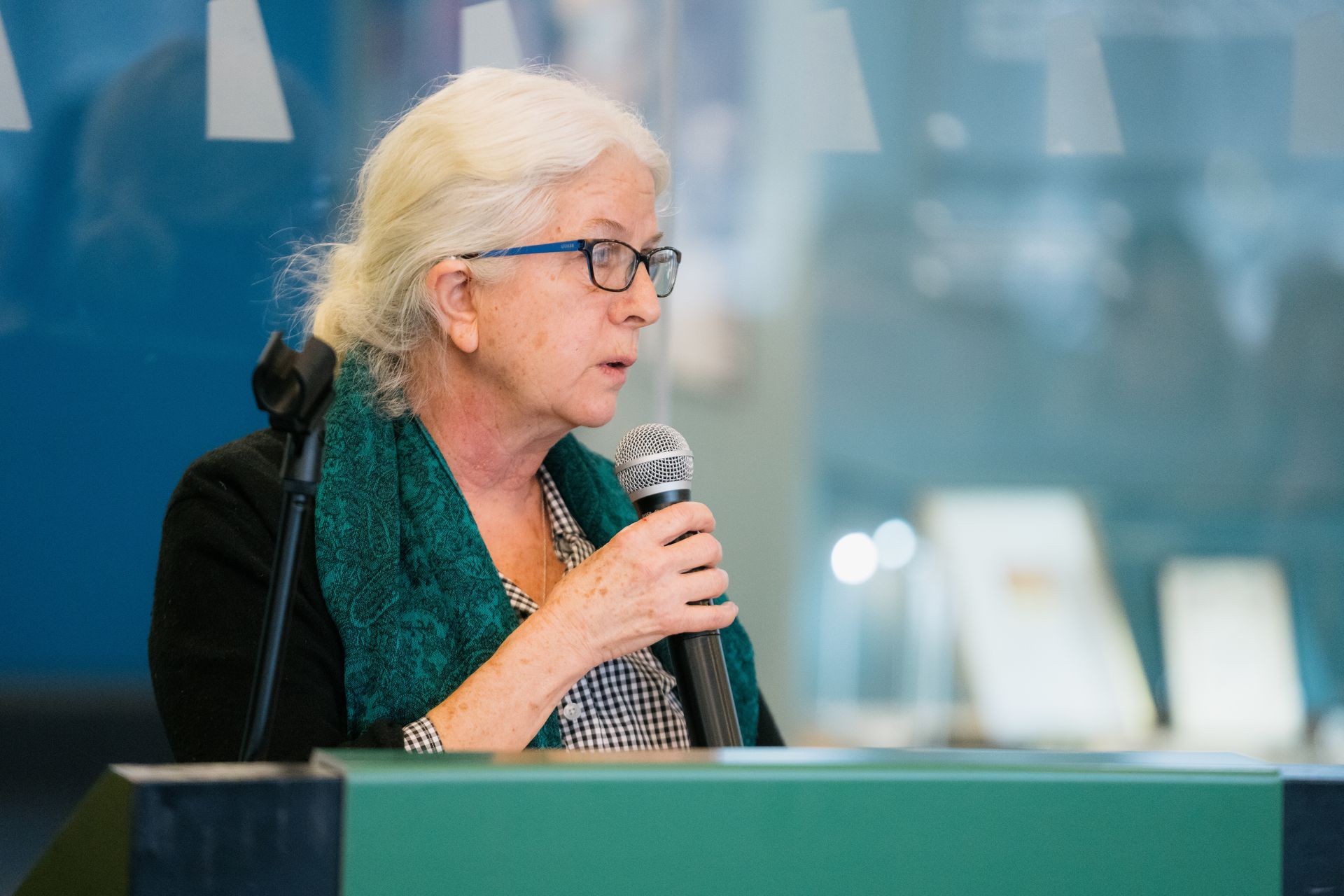
Slide title
Write your caption here
Button
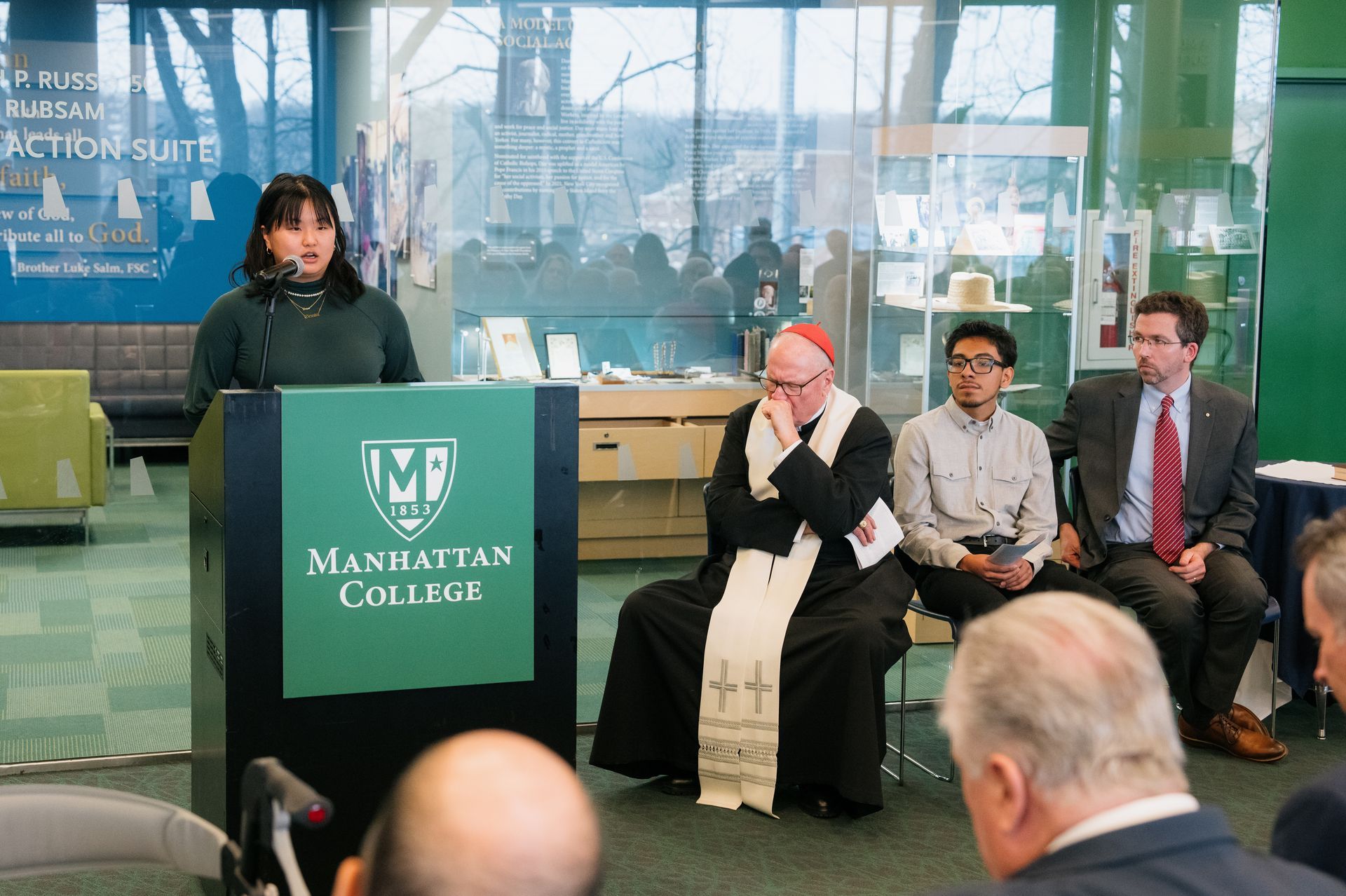
Slide title
Write your caption here
Button
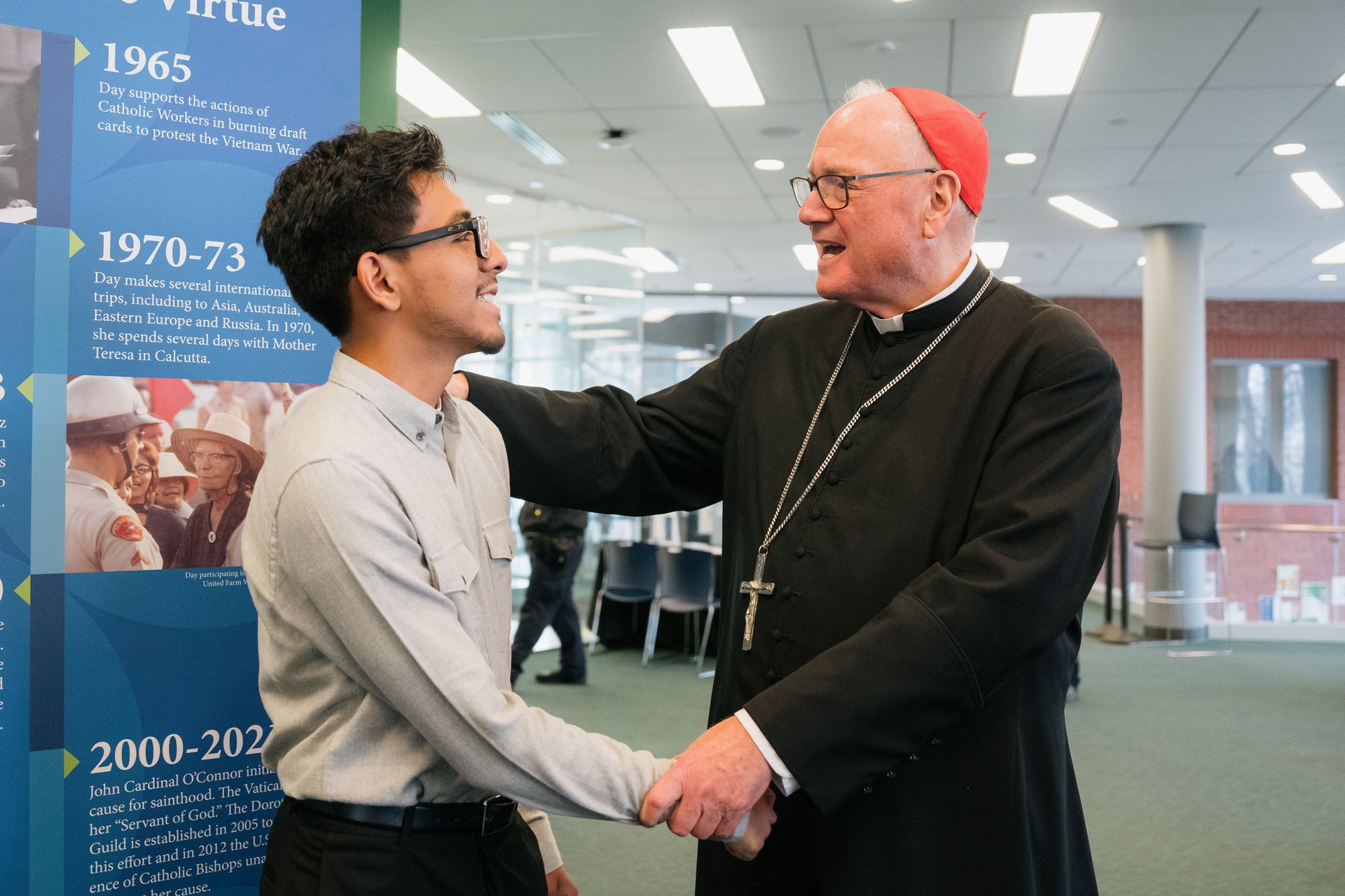
Slide title
Write your caption here
Button
The celebration on February 22nd featured a blessing by Cardinal Timothy Dolan, a reading from Dorothy’s writings by her granddaughter, Guild advisory board member Martha Hennessy, and hymns by the Manhattan College music ministry. After the dedication, our co-chair Dr. Kevin Ahern moderated a panel discussion by Manhattan College current students and alumni Mark Colville ’85, founder of the Amistad Catholic Worker community in New Haven, Connecticut; Thomas Dobbins ’86, director of justice and peace at Catholic Charities New York; Alannah Boyle ’18, former intern for the Dorothy Day Guild; and Rebecca Kranich ’24, former intern for the Dorothy Day Guild, all of whom spoke on how Dorothy’s lived witness has influenced their own lives and work. We have been so moved by how each of these men and women have brought Dorothy’s values and commitments to bear on contemporary issues of armed conflict, genocide, homelessness, and global poverty.
The Good Newsroom
released a video with some clips from the dedication, which includes Cardinal Dolan’s remarks and a brief interview with Dr. Kevin Ahern. As Cardinal Dolan noted, the timing of the dedication during the Lenten season was particularly significant. The three traditional pillars of Lent are prayer, fasting, and almsgiving, and as the Cardinal said, “Dorothy did them all in spades– a woman of intense, passionate prayer, a woman of sacrifice and self-denial, and a woman who literally poured herself out in sacrificial love and service for others.”
Be sure to also check out
our Facebook page for more photos of the event! Afterwards, visitors had the opportunity to tour the exhibit of artifacts from Dorothy’s life, including her iconic sunhat, which she wore at her final arrest, her favorite books, and personal cards and letters she received and sent to friends and relatives. If you weren’t able to attend the dedication last month, you can read some reflections from Manhattan College community members who have been substantially involved in the Catholic Worker movement and Dorothy’s canonization cause in
The Quadrangle,
or listen to this
recent episode of the JustLove podcast, featuring an conversation with Tom Dobbins and Kevin Ahern. We look forward to welcoming you to the Center the next time you are in New York!
Our Lenten book group has been having a great time reading and discussing Dorothy’s
The Long Loneliness on Sunday evenings this month, guided by the historical expertise of Dr. Anne Klejment. The lively conversations have been both intellectually stimulating and spiritually rich, and Dr. Klejment and I have really appreciated the range of perspectives and insights that this multigenerational and ecumenical group has brought forward. We will meet one more time on the evening of
Palm Sunday, March 24th, at 8:00 pm Eastern/7:00 pm Central, and we’d love to have you join us, even if it’s your first time.
Sign up here to receive the discussion questions and zoom link for Sunday’s meeting.
Looking ahead to the Easter season, we’re excited to welcome you to the Dorothy Day Guild’s next online event,
“Art, Hospitality, and Activism: The Next Generation of Artists in the Catholic Worker Movement.” This webinar, which takes place on Tuesday,
April 9th, at 8:00 pm Eastern/7:00 pm Central, will feature a conversation with visual artists
Sarah Fuller of Los Angeles,
Becky McIntyre of Philadelphia, and Rachel Mills, of South Bend. All of these artists have contributed images to various Catholic Worker publications– many of you likely have a few of their prints hanging up in your homes or offices! To receive the zoom invitation for this event and join an exciting conversation about creativity, the works of mercy, the printmaking tradition in the Catholic Worker movement, and the intersection of art, hospitality, and activism, sign up using
this form.
Finally, as we mentioned in our last missive, the Center at Mariandale in Ossining, NY, is hosting a conference entitled
“Revolution of the Heart: The Spirituality of Dorothy Day,” on Saturday, April 13th from 9:30-4:00 pm. The conference will feature Guild advisory committee members Martha Hennessy and Robert Ellsberg as guest speakers and is co-sponsored by our friends at Manhattan College. Although the conference is primarily geared toward college students (and there is a special student registration rate of only $20.00 for the day, which includes lunch!), all are welcome to come and explore questions such as “How does Dorothy’s radical spirituality – grounded in volunteer poverty, non-violence, eucharistic devotion, and activism – speak to people of this day and age?” and “How might Dorothy be a wisdom figure in the contemporary world which is often deemed as secular, materialistic, and techno-centered?” Register as a student or community member
here.
Service and Learning Opportunities:
Speaking of students, we know that many college and graduate students are currently making plans for the summer or for post-graduation. We wanted to alert you to a few different opportunities for those who are interested in deepening their commitment to learning about and living out Dorothy’s legacy of nonviolence, hospitality, and voluntary poverty.
In Cincinnati, the Lydia’s House community is accepting applications for their
Dorothy Day Fellowship Program. St. Lydia’s house offers hospitality and accompaniment to young, single mothers in the Cincinnati area, and their two-year fellowship program is a great introduction for those interested in activism, social work, communal living, and maternal and child health as well as those who are interested in connecting with the wider Catholic Worker and Christian social justice network in the United States. Fellows at Lydia’s House can be either women or married couples, whose work will include birth accompaniment, benefits navigation, transportation, deep listening, meal planning, food preparation, religious education and child enrichment, thus living out the corporal works of mercy in a setting of encounter and solidarity with families experiencing homelessness. Lydia’s House Fellows live a life of prayer and contemplation coupled with action and advocacy. To become either a maternal and early childhood advocacy fellow or a community ministry fellow, fill out
this application.
Many Catholic Worker communities, including my own here in South Bend, are also accepting summer volunteers. If you or someone you know is between semesters, between careers, or just looking for a meaningful way to participate in the work to which Dorothy devoted her life, don’t hesitate to reach out to
your local Catholic Worker house.
Here at the Dorothy Day Guild, we are also looking for undergraduate and graduate interns for the summer and/or fall semester. Dorothy Day Guild interns have the opportunity to pursue projects related to their majors or areas of interest as well as assist with the day-to-day operations of the Guild, which can include clerical duties, social media management, membership outreach, website development, event planning, and academic research focused on Dorothy’s ongoing influence and impact on contemporary Catholic social action.
Previous interns have written for our newsletter, worked on the development of a collection of new work on Dorothy for the Manhattan College library, consulted on designing our website, hosted academic panels and webinars, cataloged personal items from Dorothy’s room at the Catholic Worker for archival purposes, launched new social media campaigns, participated in board meetings, and developed educational and promotional materials to introduce members of the public to Dorothy’s legacy of nonviolence, hospitality, and voluntary poverty.
If you are interested in social justice, faith-based activism, solidarity, and nonviolence as a practical response to conflict and would like to receive academic credit for your work on a contemporary canonization cause, we encourage you to
contact us! Interns will have the option to work remotely or in-person at the Dorothy Day Center for the Study and Promotion of Social Catholicism on the campus of Manhattan College.
We also wanted to pass along a recent article by our friend Ralph Moore over at
Black Catholic Messenger,
“Canonization Requires Miracles: The Saintly Six Lived Them.”
Ralph has been a tireless advocate for the causes of the “Saintly Six,” the Black American Catholics who currently have active canonization causes open. Ralph’s article provides a helpful explanation of what officially constitutes a miracle in a canonization process and why the Vatican requires these for a candidate’s cause to progress, but also challenges this definition, understanding the re-unification of a Church divided by anti-Black racism to be itself a miraculous process. The Saintly Six, who now include four Venerables and two Servants of God “answered to a higher calling than the American legal system and ungodly Church practices. They accepted God’s work as their own and brought healing to a once-incurable disease,” Ralph writes. “Healing the sinful sickness of racism in America is the miracle wrought by these six.”
Please continue to pray for all of those working on canonization causes for the Saintly Six, all of whose witnesses and apostolates remain at the heart of the Gospel. If you aren’t familiar with the stories of these “yet uncanonized” saints, Noel Bradley, a parishioner at St. Pius X in the diocese of Nashville, has created
a series of short videos which make an excellent introduction to each candidate’s life of heroic virtue.
Prayer requests:
We have received quite a few renewed requests for prayer, and in these last days of the Lenten season, all of us at the Dorothy Day Guild invite you to bring these needs before God through Dorothy’s intercession.
Please remember in your prayers Debbi, who is dealing with ongoing and very serious health concerns. Her friend Cathie has mobilized their parish to pray for a miraculous recovery and for Debbi’s emotional and spiritual health during a time of physical illness and suffering and has reached out to the Guild to request your prayers as well. Please pray for Debbi’s well-being, for a complete resolution of her illness, and for the comfort of all of her loved ones. We have also been asked to pray for another friend of the Catholic Worker movement, S. who has requested to remain anonymous, but who is suffering from a terminal illness. Please ask Dorothy’s intercession for his healing, and for a cure for his disease to be developed.
Fr. Stephen Arabadjis, who is currently on sabbatical from his pastoral duties, has requested the Guild’s prayers during this time of rest and spiritual rejuvenation. He has particularly requested that friends and members of the Guild who have a practice of praying the rosary offer those prayers on his behalf. The rosary was one of Dorothy’s favorite devotions, and she prayed it daily whenever possible, so please consider inviting Dorothy to pray a decade alongside you and asking her to bring Fr. Stephen’s needs to God.
In New Mexico, Judy Clancy has requested prayers in support of a new endeavor to build a sewing factory which will employ and promote the work of Navajo women textile artists at the San Juan College Business Center in Farmington, which adjoins the Navajo Nation. This endeavor recently received a generous donation of sewing machines from the college, but they are in need of additional funding. Thanks to her long association with Peter Maurin, Ade Bethune, and her daughter Tamar, Dorothy developed a deep respect for and interest in craftwork and small industries and was always a staunch ally of workers in their struggle for dignified employment, so we know this project is close to her heart. Judy has committed the sewing factory to Dorothy’s care, so please continue to petition God to enable these talented artisans to preserve and pass on their cultural heritage as well as earn a living wage to support their families.
Finally, we have been overjoyed to hear of
a new Catholic Worker community which was recently established on Staten Island with a particular charism to serve young people who have aged out of the foster care system. It is so exciting to hear how Dorothy’s example of courageous faith and love for the poor is still inspiring new and creative projects in a place she loved so much during her lifetime. The community’s founder, Debbie Sucich, has requested the Guild’s continued prayerful support for the growth of their house of hospitality and for the needs of their extended community. If you are in the New York City area, please
visit their website to find out more about how you can participate in the wonderful work this community is undertaking together.
A few words from Dorothy:
Normally, we close this letter with a short selection from Dorothy’s writings; however, in the spirit of St. Patrick’s day (a month-long celebration in South Bend, and perhaps in your town or city as well!) and to honor the Irish monastic heritage which heavily influenced Peter Maurin’s program for “building a new society in the shell of the old,” we’d like to share a 1973 interview from Ireland’s RTÉ. In this interview with presenter Nodlaig McCarthy, Dorothy credits her conversion to her reading of St. Augustine and James Joyce, and speaks about the freedom, but also the rigor presented by the Gospels. In the last judgment, she says, God will ask if we attended to “the bodily and physical needs of those around us. And the works of war in the present day are the very opposite of this. The works of war destroy the food, destroy the homes. Everything opposite of what our Lord asks. So that makes us, of course, very ardent pacifists.”
At the time of this interview Dorothy only knew of about thirty Catholic Worker communities, although she does say that more keep springing up, and they do, to this day! Today, there are more than five times that many communities, spread across five continents. It is so wonderful to hear of the many ways you are all bringing Dorothy’s legacy of pacifism, her commitment to voluntary poverty, and her spirit and practice of hospitality to life in new ways all these years later.
We wish you a peaceful Lent, a blessed Triduum, and the joy of the resurrection at Easter.
Yours,
Dr. Casey Mullaney, on behalf of the Dorothy Day Guild


